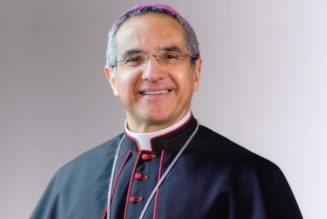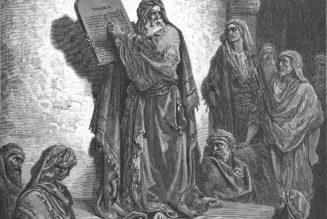
For spiritual reading, I am currently reading The Book of the Pastoral Rule by St. Gregory the Great. Pope Saint Gregory was a master at taking details from the Old Testament priesthood and applying them to the priests of the New Covenant. In one reflection, he remarks on the details of the breastplate of the high priest and what they signify.
In effect, Pope Gregory instructs the priest to guard his heart, keeping it safe from the poison of false doctrine and misplaced affections, wherein he fears man more than God and desires affection and approval more than speaking the truth.
And while his words apply especially to priests, surely they apply as well to any who would preach, teach, parent, or witness in the world today. I’d like to consider a few excerpts from his reflection on the breastplate that was worn by the high priest. As is often the case, I will present the original quote in bold black italics, and my own, inferior remarks in plain red text. The quotes come from the Pastoral Rule Part II article 2.
Thus, it was assigned by the divine Voice that on the breast of Aaron, the vestment of judgment should be closely bound by bands (Exodus 28:15, 28). This was so that the heart of the priest would not possess fluctuating thoughts, but be bound by reason alone. Nor should he consider indiscreet or unnecessary thoughts.
First note the use of the word “bands.” At the root of the meaning of the word “religion” is the same concept. The Latin root of the word religion speaks of being bound closely to or embraced by God (re = again + ligare = to bind). Thus the virtue of religion binds one’s heart, mind, and soul. One’s whole self is bound fast to God, held tightly by Him in an embrace of love and truth. Many people denigrate the word religion today as sounding too institutional. Many say they are “spiritual but not religious.” But as can be seen from its root, religion is a beautiful word describing an embrace with God.
Therefore the bands of the high priest’s breastplate remind all of us of our need to be bound and held fast to God and by God. They remind us to not allow ourselves to waiver, wander, or be carried off from the love and truth of God. We are not to be enamored of the world or its lies; neither should we embrace or cling to them.
The bands of the breastplate of the high priest, drawn tightly and snugly, remind us to cling to God and be held closely by Him. And indeed, as Pope Gregory goes on to say, being thus held close to God and His truth, the priest will not easily fluctuate from the truth; he will not wander off in all sorts of different directions. Being held close by God, his own beating heart begins to synchronize with the heart of God. Cor ad cor loquitur (Heart speaks to heart). Gradually the priest’s heart will become much like the heart of God, loving the things of God and the people of God with proper and ordered affection, wanting only what God wants.
Further, being held fast by God will also preserve the priest from what Gregory calls indiscreet or unnecessary thoughts. Indiscreet matters are those matters into which we ought not delve or pry. All of us know that there are things we ought not seek to know, things that are none of our business. The priest should properly seek to know only those things he needs to know. He should also remember that there are many things he cannot fully know, many of the deep mysteries of God about which he must humbly admit he knows little.
As for unnecessary thoughts, this surely refers to the thousands of trifling things that often occupy many people throughout the day: discussions about sports, or Hollywood celebrities, or the minutia of popular culture. Some small diversions in life have their place, but most of these accumulate excessively in our mind. We think too much of frivolous things and not enough about eternal, glorious, edifying, and lasting things. Almost any silly thought can enter our mind and we are carried off in one of a thousand different directions. But to be held fast by God is to occupy our minds especially with His glorious truths, to begin to adopt His priorities, to think about the things that are most important, helpful, and edifying.
… It was strictly added that the names of the twelve patriarchs should also be depicted (Exodus 28:29). For to carry always the inscribed fathers on the breast is to meditate on the life of the ancients without interruption … To consider unceasingly the footsteps of the Saints.
Yes, every priest, preacher, teacher, parent, and leader in the Church should be deeply rooted in the wisdom of the saints and in the ancient and lasting truth revealed by God in Holy Scripture and Sacred Tradition. To be a true Christian is to be deeply rooted in these things, always going back to that which is ancient and proposing it ever anew. The truths of God are non nova sed nove (not new things, but understood newly).
[The breastplate] is fittingly called a “vestment of judgment” because the spiritual director should always discern between good and evil … Concerning this it is written: “But you shall put on the breastplate of judgment, the doctrine and truth, which will be on Aaron’s breast … and [the priest shall] not add an element of human reasoning as he dispenses his judgments on behalf of God … Otherwise, personal affections might get in the way of zealous correction …
And here Pope Gregory warns against the human tendency to compromise the truth or to engage in rationalization. We can either add to the Word of God or subtract from it, but in so doing we render harm to the purity it should always have in our heart, in our mind, and on our lips.
Too easily, many priests, preachers, and teachers get carried away with trendy notions or theological speculations that can begin to substitute for the true word of God. Instead of preaching the Word directly from Sacred Scripture and from Sacred Tradition, too often he ends up preaching speculation or theories that serve more to raise doubts about or deflect from the true meaning of the Word of God.
St. Paul said to Timothy, Preach the word, be urgent in season and out of season, convince, rebuke, and exhort, be unfailing in patience and in teaching (2 Tim 4:2). He did not say preach lots of theories and speculations. Speculative theology has its place, but the priest must be careful not to be carried off by so much speculation that the actual Word of God is neglected. All of his judgments about what is right and what is wrong, what is good and what is evil, should be deeply rooted in the wisdom and the truth of God and not be tainted by dubious opinions, trends, fashions, popular opinions, or unbalanced notions.
The priest must also be aware of personal affections and preferences. Too often in human affairs, who said something becomes more important than what he said. Affection and admiration have their place, but everything must be judged by and squared with the truth of God, no matter who says it. No one should be so quick to esteem the opinions of so-called experts without first considering how and if what was said squares with the revealed truth of Scripture and Sacred Tradition. St. Paul says, Test everything; hold fast what is good, abstain from every form of evil (1 Thess 5:21-22).
If one fearfully considers the One who presides over all things then he will not direct his subjects without fear.
Here is a very deep human problem: fear. Too many priests, parents, teachers, and others in the Church fear human beings rather than God. God would have us simplify things in our life by fearing Him alone and then not having to fear thousands of others.
Yes, too many priests and other leaders cower before congregations and preach so vaguely and blandly that almost no one can remember what was said, and their obfuscations disguise the Word of God more than reveal it.
The first question every preacher and teacher should ask is “What would God think of what I have said today?” But too many of us who preach are more concerned with the opinions of men. The fear that a preacher should have is not whether his congregation is pleased, but rather whether God, who will judge him one day, is pleased. If he fears God, then he will direct his people with holy fear, not out of fear of man. He will have a proper and holy reverence for God, to whom we must one day be accountable for our office. May neither our silence nor our rash speech condemn us!
https://youtu.be/gqZtjXckaik
Join Our Telegram Group : Salvation & Prosperity







